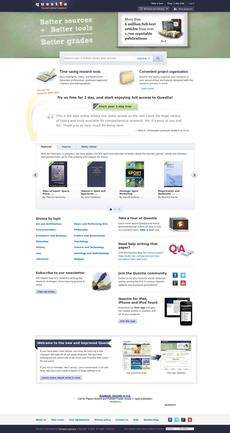Questia Online Library
Questia is an online commercial digital repository of books and articles that has an academic orientation,[1] with a particular emphasis on books and journal articles in the humanities and social sciences.[2] All the text in all the Questia books and articles is available to subscribers; the site also includes integrated research tools.[2]
Questia logo | |
Full page screenshot  | |
Type of site | Online digital library |
|---|---|
| Available in | English |
| Founded | 1998 |
| Headquarters | Chicago, Illinois, |
| Owner | Gale |
| URL | www |
| Commercial | Yes |
| Current status | Active |
Company history
Questia, based in Chicago, Illinois, was founded in 1998 and purchased by Gale, part of Cengage Learning, in January 2010.[3][4]
Service
Questia offers some information free of charge, including several public domain works, publication information, tables of contents, the first page of every chapter, Boolean searches of the contents of the library, and short bibliographies of available books and articles on some 6500 topics.
Questia does not sell ownership to books or ebooks, but rather sells monthly or annual subscriptions that allow temporary online reading access to all 94000+ books, and 14 million + journal, magazine, and newspaper articles in their collection.[2] The books have been selected by academic librarians as credible, authoritative works in their respective areas. The librarians have also compiled about 7000 reference bibliographies on frequently researched topics. The library is strongest in books and journal articles in the social sciences and humanities, with many older historical texts. Original pagination has been maintained. The Questia service also features tools to automatically create citations and bibliographies, helping writers to properly cite the materials.
A limitation to the Questia library is that new additions are available in a "beta" version only. Unlike Questia's earlier publications, these prevent users from copying text directly from the website, although one page from the publications can be printed free of charge. A charge is made for printing a range of pages.
Questia launched their Q&A blog on September 21, 2011.[5] Q&A is divided into "Education news," "Student resources" and "Subjects" categories. "Subjects" is further broken down so readers can find specific content based on their academic needs.[6]
Questia released an iPhone app in 2011, which was extended to the iPad the following year.[7] Then in January 2013 Questia launched tutorials, including videos and quizzes, to teach students the research process.[8]
Criticism
Questia was criticized in 2005 by librarian Steven J. Bell for referring to itself as an academic library, when it concentrates on the liberal arts and treats users as customers rather than students. Moreover, Bell argues, Questia does not employ academic librarians or faculty. Although some of its employees have advanced library degrees, they do not work or collaborate with faculty to develop collections that serve distinctive student populations.[9]
See also
References
- "Questia Unveils New And Improved Website to Help Students Write Better Papers Faster". Equities.
- "About Us". Questia. Retrieved May 12, 2015.
- "Gale acquires questia". January 28, 2010. Archived from the original on April 26, 2010. Retrieved April 24, 2019. Gale
- "About Us". Questia School. Retrieved May 12, 2014.
- "Questia, the Premier Online Research Paper Writing Tool, Launches Q&A Blog - CHICAGO, Sept. 20, 2011 /PRNewswire/". Prnewswire. Illinois. September 20, 2011. Archived from the original on April 18, 2012. Retrieved August 10, 2012.
- "Q&A – Research paper tips from Questia". Questia. Retrieved August 10, 2012.
- "Making College Students' Lives Easier: Questia Launches Free iPad App to Help Write Research Papers". Cengage Learning. Retrieved May 12, 2014.
- "Questia Research Tutorials Help Students Learn the Process and the Skills Necessary to Write a Research Paper by Improving Writing and Researching Proficiency". PR Newswire. January 31, 2013. Retrieved April 26, 2019.
- Steven J. Bell, "Electronic libraries can't be academic" Chronicle for Higher Education September 30, 2005

External links
- "Official Website". Questia.com.
- "Questia School". questiaschool.com.